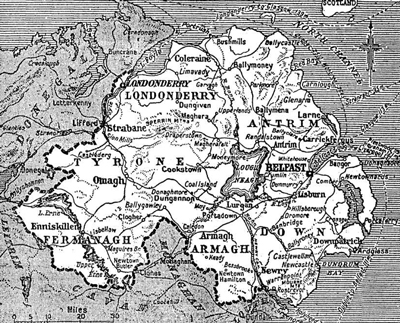Six counties opt out of Irish Free State as Craig dismisses Boundary Commission as ‘dirty work
Belfast, 8 December 1922 – Hopes in the south that the six counties could be convinced to move towards unification have been dashed as both houses of the Northern Irish parliament unanimously endorsed an address to King George V asking to be permanently excluded from the Irish Free State.
Moving the address, the Prime Minister of Northern Ireland, Sir James Craig, said that the unionist majority had no desire to do more than cooperate with their separate institutions for the prosperity and peace of the whole of Ireland. The only way to secure peace and cooperation was, Craig outlined, for the south to settle its own affairs and for the north to carry on with its own parliament and executive.
Craig also voiced his objection to the Boundary Commission and his determination to have nothing to do with it. He described the proposed commission as ‘dirty work’ and he stressed that he had no responsibility to assist in carrying out a bargain which was arranged behind the backs of Ulster unionists and in breach of a pledge that former Prime Minister, David Lloyd George, had made to him personally.
Speaking during the same parliamentary session, the north’s Minister for Finance, Hugh Pollock, argued that relations between north and south involved two distinct issues: political union and economic unity. There was, he argued, no reason not to continue with their economic unity because if it were not maintained the position of both would be endangered.
The decision of the northern parliament to opt out of the Irish Free State, despite nationalist hopes, is not a surprise. As the Belfast Newsletter has editorialised: ‘No reasonable man could have expected any other decision.’
The Newsletter also carried a message for the nationalist minority in the six counties, urging them to end their policy of passive resistance to the northern regime. ‘They have no more ground for hoping that they will come under a Dublin parliament than the rebels have for believing that they will be able to establish a republic. If they [northern nationalists] are under the impression that Sir James Craig’s conciliatory language towards them is a sign of weakness, they are mistaken, for while he and his colleagues want to maintain harmony in the area under their jurisdiction, they are strong enough to enforce the law if it be resisted.’
[Editor's note: This is an article from Century Ireland, a fortnightly online newspaper, written from the perspective of a journalist 100 years ago, based on news reports of the time.]





















